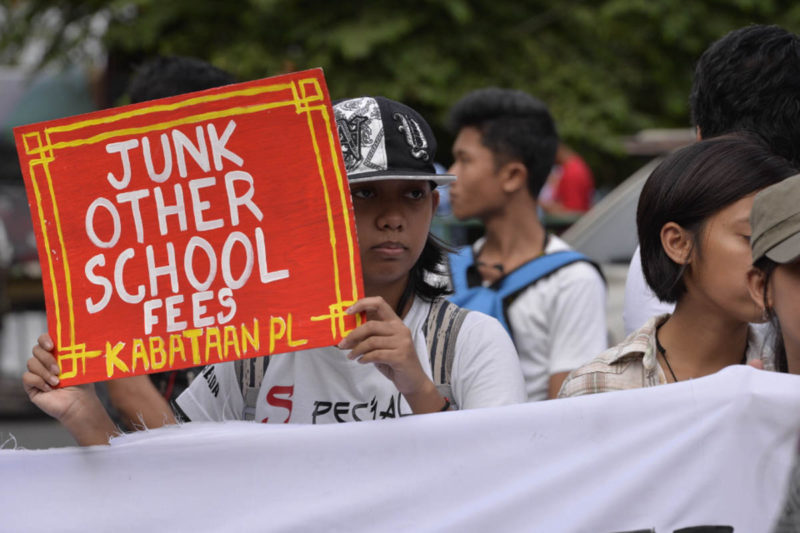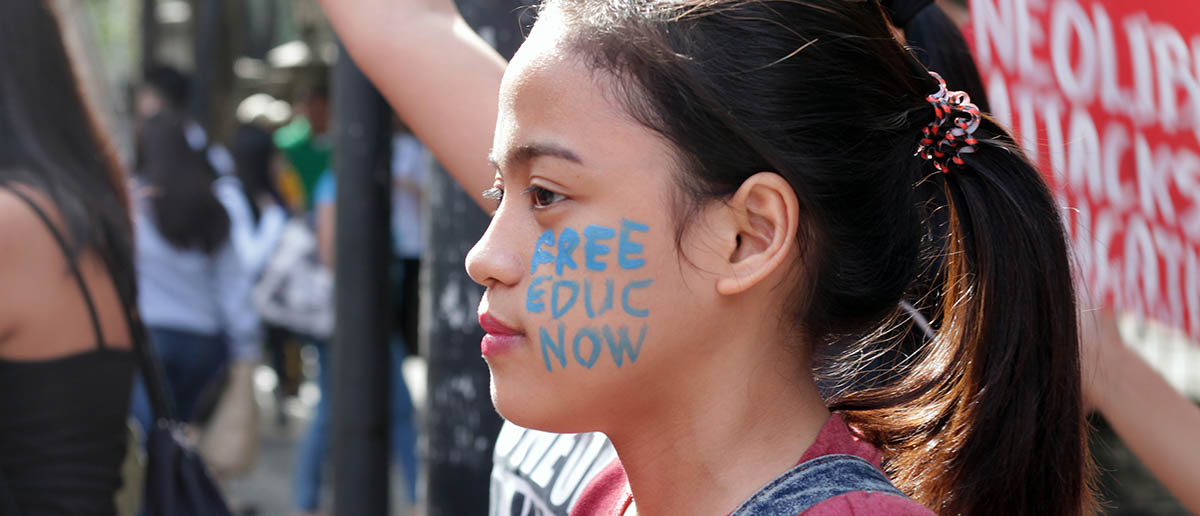Early in March, the Free Higher Education For All Act was passed by the Philippine Senate. Should the bill become law, tuition fees in all state universities and colleges (SUCs) will become fully subsidized by the government.
The passage of the bill in the Upper House was lauded by many as a move towards making education accessible to all. On its approval, Senator Paolo Benigno “Bam” Aquino IV, the bill’s co-author and principal sponsor in the Senate, said that “[the] Senate sent a strong signal.”
“Our priority is education. We are investing in educating our countrymen and arming them with the knowledge and skills to build a better future for their family,” he added in his endorsement speech for Education Secretary Leonor Briones before the Commission on Appointments.
Though the measure was approved unanimously, it has also attracted criticism from various quarters. President Rodrigo Duterte’s top economic administrators in the cabinet have opposed the plan because of economic and budgetary concerns. This position is echoed by officials of the Commission on Higher Education (CHED). On the other hand, youth group Kabataan Partylist expressed concern over certain measures in the bill that they find counterproductive to the project of universal free education.
Subsidizing the future
The bill provides for the institutionalization of a tuition-free policy in all SUCs through the establishment of an SUC Tuition Subsidy Fund. The fund would be administered by CHED, with an initial allocation of Php 15 billion. SUCs could then use this allocation to make up for the tuition costs. All Filipino students who meet the admission requirements for bachelor’s or other undergraduate degrees for SUCs are eligible for free tuition.
The bill also allows students with the financial capacity to opt out of the tuition subsidy. Provisions are also made for the strengthening the Unified Student Financial Assistance System for Tertiary Education (UniFAST), which provides additional assistance for students in need.
Aside from subsidies for SUCs, amendments introduced by Sen. Ralph Recto also provides for tuition subsidies for students in private higher educational institutions and technical vocational institutions through additional student financial assistance programs.
Meanwhile, complementary bills in the House of Representatives have hurdled the committee level and have come one step closer to landing on the President’s desk for signature.
The bill received glowing endorsements, especially from its proponents in both houses of Congress. Aside from Senators Aquino and Recto, the bill was also lauded by Sen. Richard Gordon, who praised the bill for “[providing] confidence to our people who feel college education is a mountain so high they’ll never reach it.”

Government back-and-forths
Proponents of this bill see its passage as a culmination of a long and drawn-out process. Several of the legislators who were instrumental in forwarding the proposal campaigned on free education.
A major development ocurred during the budget deliberations for fiscal year 2017. CHED was given an additional budget of Php 8.3 B to subsidize tuition fees in state universities and colleges. The House of Representatives initially wanted the money to be allocated to the Department of Public Works and Highways to fund for their project in the Autonomous Region in Muslim Mindanao. After much discussion and deliberation, Congress decided to allocate it to CHED instead.
However, the project of providing free tuition in SUCs would not be sustainable if it is not institutionalized. The Free Higher Education For All Act and its counterparts in the House are meant to provide for this by introducing regular allocations for the SUC Tuition Subsidy Fund and mandating CHED to govern over subsidizing SUC tuition fees.
CHED has yet to present the details on how they will implement the bill if Congress finally passes it. However, in 2015, they wrote a position paper saying that a free-tuition policy will likely cause a large number of students to transfer from private higher education institutions to state universities and colleges.
Aside from CHED, other high-ranking officials have also come 0ut against the tuition subsidy project. In a rather surprising turn of events, the economic managers of President Duterte — National Economic Development Authority Secretary Ernesto Pernia, Budget and Management Secretary Benjamin Diokno, and Finance Secretary Carlos Dominguez — announced that they would rather fund UniFAST rather than carry out the free tuition fee policy for state universities and colleges because the former would be able to address the underlying problems of SUC students more efficiently.
To justify their claim, they cited the Philippine Statistics Authority’s 2014 Annual Poverty Indicators Survey which showed that only 12% of SUC students belonged to the bottom 20% of the family income classification.

‘Rethinking of education policies’
In contrast to those concerned over the program’s feasibility, youth sectoral party Kabataan Partylist believes that the bill does not do enough for the country to have an ideal education system.
The party’s representative in the Lower House, Representative Sarah Elago, has filed a different bill, the Comprehensive Free Public Higher Education Act. In an interview with The GUIDON, Elago explains that unlike the bill that passed the Senate, her bill “does not espouse the concept of ‘subsidizing’ tuition and other school fees. Rather, it rethinks the manner in which public financing of state-run higher education institutions is done.”
The bill proposes to “finance the actual ‘cost of attendance’ of students, the total amount a particular state-run university or college needs to provide education for a student per year, including proportional cost per student for personnel services, maintenance and other operating expenses, and capital outlay.”
In justifying the bill, she added that “[the] government currently follows the neoliberal economic framework; in higher education, that means increasing tuition and other school fee rates. Unless the government veers away from such thinking, we will never have free education for all at all levels.”
Models for free education
If implemented, this law will be the country’s first initiative to push for a more accessible tertiary education opportunity for all. Countries such as Germany and Sweden have already been implementing a similar bill since the late 2000s.
However, some other countries that offer free college education have been receiving negative feedback after enacting the program.
In Brazil, for instance, the entrance exam for the public universities are said to be extremely competitive. As a result, people from the elite or middle class are usually the ones who get admitted. In Chile, a program that was carried out in 2016 led to 80,000 students being able to acquire a tuition-free university education. Despite this, some citizens of Chile did not respond to the program well, citing the fact that many more university students are ineligible to acquire free tuition, and not all universities are required to comply with the program.




